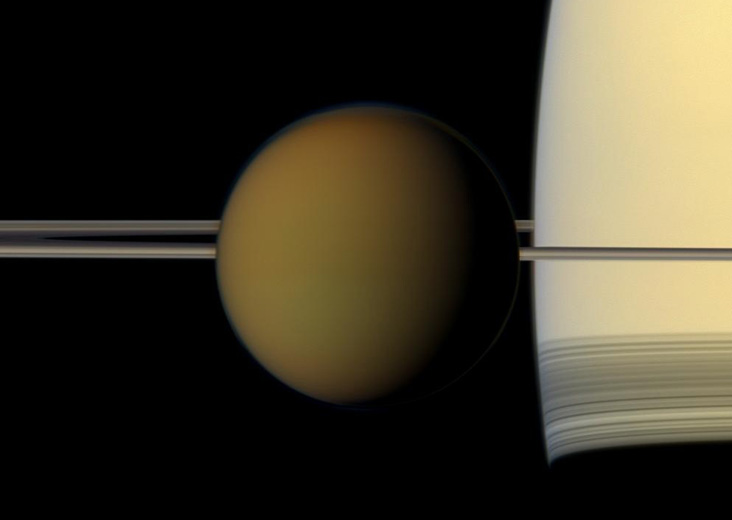
NASA’s Cassini spacecraft, which has been exploring Saturn and its many moons (roughly 60 discovered so far) since 2004, recently discovered an ingredient on the moon Titan that is very common here on Earth, one which is probably in your kitchen right now. Propylene, which is used in making food-storage containers and other plastic consumer products, has never been detected anywhere outside of Earth, until now.
“This chemical is all around us in everyday life, strung together in long chains to form a plastic called polypropylene,” said Conor Nixon, a planetary scientist at NASA’s Goddard Space Flight Center in Greenbelt, Md. “That plastic container at the grocery store with the recycling code 5 on the bottom—that’s polypropylene.”
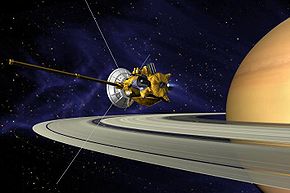
The discovery came courtesy of Cassini’s Composite Infrared Spectrometer, or CIRS, which measures the infrared light emitted from Saturn and its moons in the same manner you feel heat over a campfire. CIRS can identify a particular gas in an atmosphere from its unique thermal fingerprint, and researchers isolated the same signal at different altitudes within Titan’s atmosphere to identify the plastic ingredient—which they already believed was there based on observations made by Voyager-1 in 1980 when it flew by Titan and Saturn.
“This measurement was very difficult to make because propylene’s weak signature is crowded by related chemicals with much stronger signals,” said Michael Flasar, Goddard scientist and principal investigator for CIRS. “This success boosts our confidence that we will find still more chemicals long hidden in Titan’s atmosphere.”
Titan has intrigued researchers for quite some time because it is the most Earth-like world known to science, with an atmosphere rich in organic compounds such as nitrogen. Organic molecules that contain carbon and hydrogen, which often include oxygen and other elements similar to what is found in Earth’s atmosphere, are also found on Titan. The chemicals that make up petroleum and other fossil fuels on Earth are also found in Titan’s atmosphere. Methane is also found in large quantities on Titan; there are even liquid seas of methane present on the surface, the only liquid lakes yet discovered anywhere besides Earth.
Video Credit: NASAexplorer
Propane also exists on Titan, which is a common fuel used in large quantities here on Earth. But, with an average temperature of -290 degrees F, it is very unlikely life could ever take hold there because that is too cold for liquid water to exist, but the organic nature of some of the chemicals found in Titan’s atmosphere might indicate that this planet-like moon could harbor some form of life. Researchers believe it actually rains methane and other gasoline-like liquids on Titan, and standing on Titan’s surface would feel much like the bottom of a swimming pool due to the fact that it’s atmospheric pressure is about 60 percent greater than Earth’s.
“With its organic dunes, lakes, channels and mountains, Titan has one of the most varied, active and Earth-like surfaces in the solar system,” said Ralph Lorenz, Cassini radar scientist at the Johns Hopkins Applied Physics Laboratory in Laurel, Md. “The combination of an organic-rich environment and liquid water is very appealing to astrobiologists.”
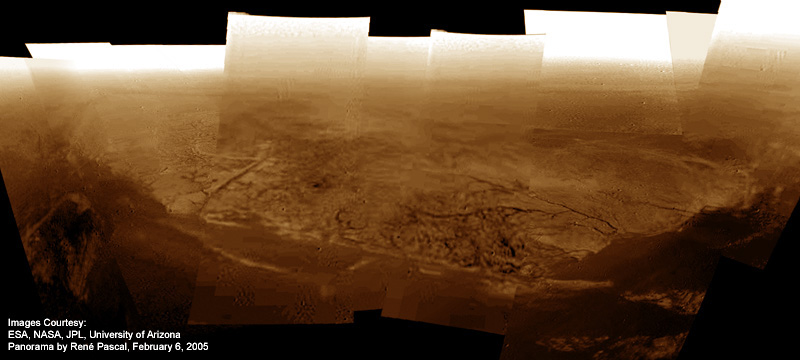
Titan remains the only outer Solar System world where mankind has actually landed a spacecraft, the Huygens lander, which flew to Saturn with Cassini before making its suicidal dive through Titan’s atmosphere on Jan. 14, 2005. The fully instrumented robotic laboratory, courtesy of the European Space Agency, captured images all the way through its descent to the surface, landing on a shoreline by parachute and sending science data back to Earth for 90 minutes before running out of power.
“The discoveries made by Cassini have revolutionized our understanding of Titan,” said JPL scientist Christophe Sotin, who has been analyzing Cassini measurements of Titan’s lakes and seas. “They open new avenues for seeking habitable worlds around exoplanets. They also trigger new questions about the exchange processes between the interior and the atmosphere—and about the composition of these organic particles—that only future missions to Titan will be able to answer.”
Cassini, which launched from Cape Canaveral Air Force Station atop a Titan-IV rocket in October 1997, is still running strong. The spacecraft took seven years to reach Saturn’s system and is expected to continue exploring Saturn and its moons until at least 2017. The mission is a cooperative project of NASA, the European Space Agency, and the Italian Space Agency.
– Want to keep up-to-date with all things space? Be sure to “Like” AmericaSpace on Facebook and follow us on Twitter: @AmericaSpace
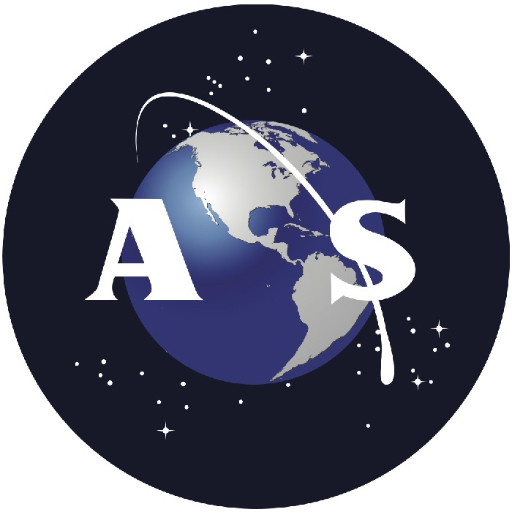
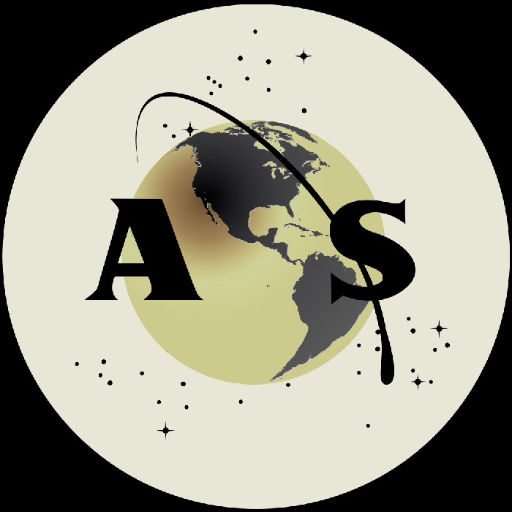


I cringe when I consider the “dead on arrival” proposed TImE mission to place a robotic lander on Titan to explore the methane river system and ocean. So much could have been learned from such an incredible mission of exploration, so much new technology developed, and perhaps even a few young people prompted to go outside and look up into the night sky. The Daily Launch of the AIAA reports that the Associated Press pointed out that NASA has furloughed a larger percentage of its workforce than any other part of the federal government, and that a NASA spokesperson stated that it was not an indication of how “essential” NASA is in the opinion of Washington decision-makers, just before the NASA spokesperson was furloughed as “non-essential”. I guess they really put me in my place with my belief that the exploration of space and all that it promises is “essential” to our long-term survival. This discovery of propylene on Titan is a tantalizing hint of what waits to be discovered on this beckoning, mysterious moon. How can any individual with an IQ above room temperature not be intrigued and fascinated, hungry to explore and learn about this amazing world? Well, at least my beagle thinks I’m “essential”.
Karol: well-stated and addresses the pinheaded-thinking that passes as learned “decision making”. To forgo further exploration of Titan is a travesty. The discovery of propylene is further evidence that wonderous discoveries await us in our “backyard” and I am convinced that scientists are chomping at the bit to get back on Titan’s surface.
Well said Tom. IMHO, forgoing any space exploration is a travesty.
I was putting some of my thoughts on paper, some time ago, about the perceived ‘lack of usefulness’ of space exploration, in today’s financially-obsessed culture. These thoughts bear a re-visit, with the on-going beyond-belief US government shutdown, and the subsequent negative impact on science, NASA and space exploration:
A critique to the financially-driven and profit-obsessed humanity of today…
(also, a collection of my thoughts on the subject)
Since when is everything measured in relation to its potential for financial profit? Have we regressed so much as a species that we deem worthwhile only that which gives us an immediate wealth and return on investment, without having the patience to invest on something bigger than ourselves and more long-term? Have we regressed so much as to think that everything that isn’t immediately financially profitable is ‘useless’ and unworthy of our effort and time?
Why do we appreciate the beauty of a blooming rose in a green field? Why do we appreciate art and philosophy? Why do we strive for the big ideas and all the big ideals? Why do lovers gaze at the full Moon? Why do we enjoy the sight of a beautiful sunrise and sunset? Why do people climb to the highest peaks and mountains to enjoy the view from such high altitudes? Why do we gaze at the night sky? Why do we gaze at the stars? Are any of those things financially profitable and ‘worthwhile’ at all? Does it earn us any more money? If not, then what’s the point of us perusing such things? Maybe because life and being human is so much more than quarterly and annual financial reports and figures!
NASA is the only agency on Earth which, as the NASA Chief Historian Steven J. Dick acknowledges “carries on in “the new ocean” of outer space, a long tradition of expanding the physical and mental boundaries of humanity.”.
Since when do we deem such a noble endeavor ‘unworthy’ and ‘unprofitable’? Since when did money become such an issue? We perpetually create and consume wealth. Money is meant to be spent anyway. We might as well spend it on something really worthwhile, that is also financially profitable, as is the case with space exploration, as many economic analyses have shown in the past, time and again. Do we really believe that the money ‘saved’ from going to space exploration will be put inside a vault never to be spent? It will be spent on countless other things anyway!
Since we choose to weight everything so much against it’s profit margin, and since space exploration has been proven to be a profitable endeavor, then what’s the argument against it anyway? If we’re so worried about the money it takes to invest in it, then we really haven’t been paying attention to the long list of myriad other things that we spend money on, things that don’t even give us anything back in return financially!
Financial gain aside, space exploration expands our minds. It raises and levitates our spirits to new heights and realms of existence. Since when that is labeled ‘useless’?
If after all these, we still insist that space exploration is an unworthy endeavor, then we might as well shut off our minds and spirits and start becoming accustomed to sliding downwards that long path, that leads to humanity’s regression into something sub-human and ultimately unworthy of being (whether that saves us some any money and is deemed financially ‘profitable’ at all).
The fact that such a compelling case in support of the American space program is made by an obviously highly intelligent, articulate individual who is not a citizen of this country, while American citizens are either obsessed with the trivial or even hostile to our amazing space program makes me wonder with trepidation if our beloved America reached her zenith with “one small step”. If so, may our merciful God forgive us for the opportunity that we have wasted.
Karol, I was listening to an interview given by Nichelle Nichols on Star Talk radio some time ago, and she wisely said, that ‘if America moves on or falls, it will be by its own doing’. I think it’s as simple as that.
To me personally, the fall and abandonment of the US space program, would be a tragedy equal to the burning of the Library of Alexandria, or the fall of the Greco-Roman civilisation. Most people today would probably consider such a view as naive, or hillarious, or irrelevant. But for me, space exploration is a cultural endeavor that’s on the same league with the best cultural contributions of the great civilisations of antiquity.
Yes, that ‘one small step’ was a high-point for the whole human spieces. An unparalleled feat that surpassed every achievement that came before or since. And I don’t know if the Universe generally gives any second chances. It’s something that I have given great thought on. My own personal conclusion is that even if civilisations fade, the great ideas and accomplishments of the human spirit perservere and resurface under different names and different places, through different people.
But the question still remains: Why not nourish the development of the cultural seeds that you helped to plant in the first place? Why not accomplish today the thing that if forsaken, might take untold amounts of time to be achieved in the future? Why not keep open the gates you opened in the past?
And did I turned philosophical tonight, or what? 🙂
O.K. Leonidas. No more playing around. Exactly when are you going to file your application to immigrate to this country? We certainly need people with your dedication to our space program whose logical analysis and persuasive ability is supported by what is unquestionably a sharp intellect. I wish that the American educational system provided a mastery of the English language to the level as that provided by the Greek. You obviously share the frustration of many of us AmericaSpace devotees who feel that we are “criers in the wilderness” trying to get the message through to a general public which is not interested enough to listen: “Our NASA, our program of space exploration, is a bucket of precious gems of untold value at your feet. All you need do is bend over and pick it up!” I sometimes wonder if most Americans would be interested in the bending over to pick up those gems if it didn’t involve a pop culture star “twerking”. To think that so many have sacrificed so much for you, for me, for our space program; and to think that there are many who would not object to such irretrievable, unforgivable loss. Good, there still seems to be a wee dram or two of Scotland’s finest left in the bottle.
Thank you Karol! It sure feels really nice to have a friend like you here!
It’s common knowledge that you are best at what you love, and there are only a handful of things that I love as much as space. Sadly, here in Greece, this passion is buried at worst, and at best is only pursued as a free-time hobby, as I’m currently doing now.
Now, about that immigration application, I wouldn’t think of a better place to work than NASA, but it seems to be off-limits if you aren’t already an American citizen. What are my chances about that? I really don’t know (not to mention the needed academic credentials).
The good thing about exploration is that it has a wide support among the population and the bad thing is that this
support is shallow. But ultimately, space exploration is part of our culture now (not to mention the deep longing of the human spirit), and that more or less ensures its survival (or at least I hope!).
Warmest regards to you Karol!
Karol, do you have a facebook account? It’d be great to add you as a friend! You can find me by my email: latin_heart@hotmail.gr.
A good article but the statement “Titan … is the most Earth-like world known to science, with an atmosphere rich in organic compounds such as nitrogen” is incorrect. Nitrogen is neither organic nor a compound.
On a recent visit to the KSC and the Apollo/Saturn exhibit, I was struck by the display of the various newspapers heralding the Apollo 11 moon landing. “Yeah, we actually did that!” It brought home to me the reality that mankind indeed walked on another world and that it was the United States that achieved such a feat “for all mankind.” Think about it! Shepard’s moon suit, complete with moon dust residue, was further evidence of our demonstrated leadership in space exploration. Then, sadly, we entered a period of uninspiring manned spaceflight experience constrained by the financial and political “realities” that squelched the imagination of a couple of generations since Apollo. Karol and Leonidas have eloquently made the case for a rejuvenated leadership role for America.